Surf music is rock music associated with surf culture, particularly as found in Southern California. It was especially popular from 1962 to 1964 in two major forms. The first is instrumental surf, distinguished by reverb-heavy electric guitars played to evoke the sound of crashing waves, largely pioneered by Dick Dale and the Del-Tones. The second is vocal surf, which took elements of the original surf sound and added vocal harmonies, a movement led by the Beach Boys.

The Turtles are an American rock band led by vocalists Howard Kaylan and Mark Volman, later known as Flo & Eddie. The band had several Top 40 hits beginning in 1965 with their cover version of Bob Dylan's "It Ain't Me Babe". They scored their biggest and best-known hit in 1967 with the song "Happy Together".

Zimbabwean music is heavily reliant on the use of instruments such as the mbira, Ngoma drums and hosho. Their music symbolizes much more than a simple rhythm, as the folk and pop style styled music was used as a symbol of hope for Zimbabweans looking to gain independence from Rhodesia. Music has played a significant role in the history of Zimbabwe, from a vital role in the traditional Bira ceremony used to call on ancestral spirits, to protest songs during the struggle for independence. The community in Zimbabwe used music to voice their resistance to their oppression, as one of the only weapons they had available to fight back with. In the eighties, the Music of Zimbabwe was at the center of the African Music scene thanks to genres such as Sungura and Jit. However, several performers were banned by state TV and radio leading to the closing of several music venues.
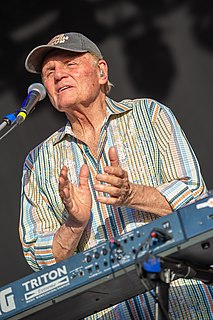
Bruce Arthur Johnston is an American musician, singer, songwriter, arranger, and record producer who is best known as a member of the Beach Boys since 1965. Johnston also collaborated on many records with Terry Melcher and composed the 1975 Barry Manilow hit, "I Write the Songs".

The Mad Capsule Markets were a Japanese band that formed in 1985 and were active until 2006. The band became known for their experimental style, which melded various kinds of electronic music and punk rock.
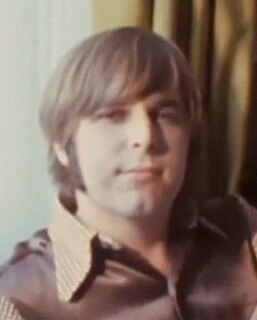
Carl Dean Wilson was an American musician, singer, and songwriter who co-founded the Beach Boys. He is best remembered as their lead guitarist, as the younger brother of bandmates Brian and Dennis Wilson, and as the group's de facto leader in the early 1970s. He was also the band's musical director on stage from 1965 until his death.

Charles "Skip" Pitts was an American soul and blues guitarist. He is best known for his distinctive "wah-wah" style, prominently featured on Isaac Hayes' title track from the 1971 movie Shaft. He is widely considered to have been one of the architects of soul, R&B and funk guitar.

15 Big Ones is the twentieth studio album by American rock group The Beach Boys released in July 1976. It comprises cover versions of rock and roll and rhythm and blues standards, along with a few new originals. The album was met with mixed reviews, but the highest sales the band had for a new studio album in many years, peaking at number 8 on the weekly Billboard albums chart. Three singles were issued: a cover of Chuck Berry's "Rock and Roll Music" and the originals "It's O.K." and "Everyone's in Love with You". The first two charted on the Billboard Hot 100 at numbers 5 and 29, respectively, and ultimately became their only top 30 hits during the 1970s.

The Wrecking Crew was a loose collective of Los Angeles-based session musicians whose services were employed for thousands of studio recordings in the 1960s and 1970s, including several hundred Top 40 hits. The musicians were not publicly recognized in their era, but were viewed with reverence by industry insiders. They are now considered one of the most successful and prolific session recording units in music history.
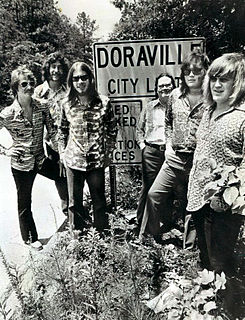
Atlanta Rhythm Section is an American Southern rock band, formed in 1971 by Rodney Justo (singer), Barry Bailey (guitar), Paul Goddard (bass), Dean Daughtry (keyboards), Robert Nix (drums), and James B. Cobb, Jr. (guitar). The band's current lineup consists of Daughtry and Justo, along with guitarists David Anderson and Steve Stone, bassist Justin Senker, and drummer Rodger Stephan.
Jit is a style of popular Zimbabwean dance music. It features a swift rhythm played on drums and accompanied by a guitar. Jit evolved out many diverse influences, including domestic chimurenga, Congolese rumba and Tanzanian guitar styles. The genre was popularized in the 1980s by bands like Chazezesa Challengers, The Four Brothers and Bhundu Boys. Jit is one of Zimbabwean fast beat, but there is a confusion between the more popular "sungura" which is said to be Jit which was popularised by Chazezesa Challengers and many others including Alick Macheso and Orchestra Mberikwazvo.

Terence William "Blondie" Chaplin is a South African singer and guitarist from Durban, where he played in the band the Flames in the mid to late 1960s. From 1972 to 1973, he was a member of the Beach Boys and contributed to their albums Carl and the Passions – "So Tough" (1972) and Holland (1973). He is a long-term backing vocalist, percussionist, and acoustic rhythm guitarist for the Rolling Stones on their recordings and tours over a 15-year period, starting in 1997. Chaplin has released two solo albums, Blondie Chaplin (1977) and Between Us (2008).
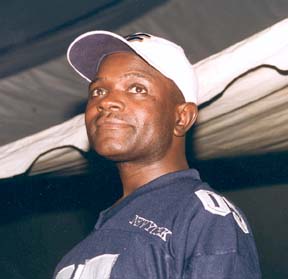
Simon Chimbetu was a Zimbabwean guitarist, vocalist and composer. He was the founding member of his band Orchestra Dendera Kings. He was known by many stage names, including "Chopper, "Mr Viscose", "Cellular", "Simomo" and "Mukoma Sam".
Chazezesa Challengers are a Zimbabwean Sungura music band formed in 1993 under the direction of the late System Tazvida in Chitungwiza. System, a Khiama Boys alumnus, grew sick of not receiving his fair share of royalties and decided to form his own band. Both his stints in Khiama Boys and the Sungura Boys had ended without any financial compensation. He recruited some experienced musicians, including his bassist brother Peter. The band of five are veterans of the Zimbabwe music scene. His brother Peter is a Nyami Nyami Sounds alumnus. Guitarist LeeRoy Lunga had played with both the Super Sounds and the Kasongo Band, while percussionist Lucky Mumiriki had experience with the Hurungwe Sounds and the Sungura Boys. The group is also known as Boyz DzeSmoko.
The Four Brothers were a pop group from Zimbabwe. The members were not brothers. They played fast-paced guitar-based pop music with songs sung in the Shona language. Their lead guitar string-plucking sound is reminiscent of the sound of the African mbira instrument and is a style known as 'jit'.
Bombay Vikings are a pop group that combine Indian pop and classical music, formed in 1994 in Stockholm, Sweden. The band was started by Neeraj Shridhar, Oscar Söderberg, and Mats Nordenborg, and became popular with remixes of old Bollywood hits such as "Kya Soorat Hai", "Woh Chali" and "Chod Do Anchal".
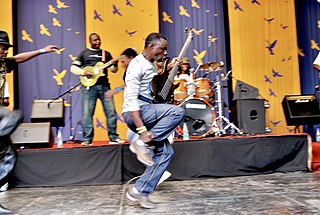
Alick Macheso, is a Zimbabwean musician. He came onto the music scene as a solo artist in 1998, with his debut album Magariro, which carried "Pakutema Munda ", probably the least noticeable from that album. The first cut never received any recognition but he continued to release Vakiridzo the following year. Similarly, the response was lukewarm and in the coming 12 months, he went back into the studio and came out with Simbaradzo.
Daluxolo Casper Mpofu, who performs under the name Casper Beatz, is a Zimbabwean producer and artist known for his popular rendition of System Tazvida's "Babe Rakanaka" known as "Chindidawo" He also released a hit single "Joseph Chinotimba" named after the politician In 2018 he was heavily involved in Andy Muridzo's album as he produced all the songs.

"I Surrender" is a song written by former Argent guitarist and singer Russ Ballard and first released by Head East in 1980 for their sixth album U.S. 1. It is better known for being a hit for Rainbow the following year, reaching number 3 on the UK Singles Charts.












